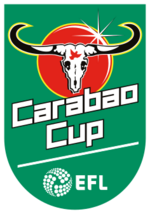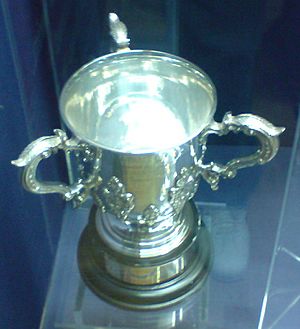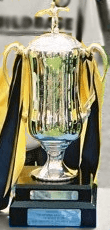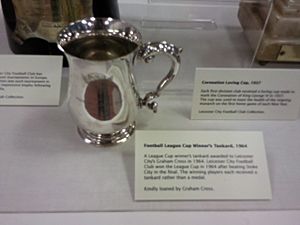EFL Cup facts for kids

EFL Cup logo used since 2017–18 season
|
|
| Organising body | English Football League |
|---|---|
| Founded |
|
| Region | |
| Number of teams | 92 |
| Qualifier for | UEFA Conference League |
| Current champions | Newcastle United (1st title) |
| Most successful club(s) | Liverpool (10 titles) |
| Television broadcasters | Sky Sports |
The EFL Cup, also known as the League Cup or Carabao Cup, is a yearly football tournament in England. It's a knockout competition, meaning teams are eliminated if they lose. The English Football League (EFL) organizes it.
All 92 professional football clubs in England can join. This includes teams from the top-level Premier League and the three divisions of the English Football League: the Championship, League One, and League Two.
The tournament started in 1960–61 as the Football League Cup. It is one of England's three main football competitions, along with the Premier League and the FA Cup. The EFL Cup final happens in late February, earlier than the other two major competitions. It was created to make football more exciting and to use new floodlights for evening games. In 2016, the tournament changed its name to the EFL Cup.
The EFL Cup has seven rounds. Most matches are single games, but the semi-finals have two games, one at each team's home stadium. The final is played at Wembley Stadium, a famous neutral venue, on a Sunday. Teams from higher leagues usually join in later rounds. The winner gets the EFL Cup trophy and a spot in a European competition, the UEFA Conference League. If the winner already qualified for Europe, their spot goes to another top Premier League team. Liverpool has won the most titles, with 10 wins. The current champions are Newcastle United, who won their first title in the 2025 final.
Contents
What is the EFL Cup's Status?
Even though the League Cup is one of four trophies English teams can win, it's seen as less important than the league title or the FA Cup. Winners get £100,000, which is not a huge amount for top teams. The FA Cup winner gets £2 million, and Premier League teams earn much more from TV money.
Because of this, some big clubs often play younger or less experienced players in the early rounds. This gives young players valuable game time. It also makes it more likely for smaller teams to cause an upset and beat a bigger club.
In the past, some thought the cup wasn't important enough. But recently, it has gained more respect. Big Premier League clubs like Manchester City, Manchester United, Liverpool, and Chelsea have won many titles. Between 2001 and 2024, these four teams won 19 of the tournaments.
History of the EFL Cup
The idea for the League Cup came from Alan Hardaker, who was the Football League Secretary. He wanted to create a new competition to help clubs earn more money. It also aimed to make English football more exciting.
The first trophy was paid for by Joe Richards, the Football League President. He was very proud of the competition. The League Cup started when fewer people were attending football matches. It also helped use the new floodlights that many stadiums had installed. This allowed games to be played on weekday evenings.
The first League Cup final was in 1960–61. Aston Villa won by beating Rotherham United 3–2 over two games. In the early years, smaller clubs often won the trophy. For example, Norwich City won it before they even played in the top division.
The League Cup became more important when its winner was given a spot in European competitions. This made bigger clubs take the tournament more seriously. The first League Cup final played at Wembley Stadium was in 1967. Third Division team Queens Park Rangers famously beat top-flight West Bromwich Albion 3–2.
English clubs were banned from European competitions after the Heysel disaster in 1985. This meant League Cup winners could not play in Europe for several years. The ban was lifted in 1990, but it took two more years for League Cup winners to get their European spot back.
In 2016–17, the competition was renamed the EFL Cup. This was part of a bigger change for the Football League.
Modern Changes to the Cup
In recent years, there were talks about removing the European qualification prize from the League Cup. However, England is one of the few countries that still offers a European spot for winning its second cup competition. This helps the League Cup stay popular, especially for fans whose teams might not qualify for Europe otherwise.
Famous Upsets in the League Cup
While the FA Cup is known for "giant-killings," the League Cup has also seen some big surprises. This is often because larger clubs play younger teams in the early rounds.
- In 1966–67, Third Division Queens Park Rangers came back from 2–0 down to beat top-flight West Bromwich Albion 3–2 in the final.
- Two years later, in 1968–69, Third Division Swindon Town beat Arsenal 3–1 after extra time in the final.
- In 1974–75, Fourth Division Chester beat league champions Leeds United 3–0 on their way to the semi-finals.
- York City beat Manchester United 3–0 at home in 1995–96. Manchester United went on to win the Premier League and FA Cup that season.
- Grimsby Town had several upsets. In 2001–02, they beat current holders Liverpool 2–1 at Anfield.
- In 2014–15, Manchester United lost 4–0 to third-tier MK Dons.
- In 2012–13, fourth-tier Bradford City reached the final, beating three Premier League teams along the way. They lost to Swansea City in the final. Swansea City became the first team from outside England to win the League Cup.
- In 2022–23, Gillingham, a League Two team, beat Premier League team Brentford on penalties.
How the EFL Cup Works
The League Cup is open to all 92 teams in the Premier League and English Football League. It has seven rounds. The first two rounds are split into North and South sections. Teams playing in European competitions join in the third round. Other Premier League teams join in the second round.
Most matches are single games. If scores are tied, they go straight to a penalty shoot-out. Extra time is only played in the final. The semi-finals are the only rounds with two games, one at each team's home ground. The Video Assistant Referee (VAR) system is used in all EFL Cup games played at Premier League stadiums.
The Final Match
For the first six years, the final was played over two games. Since 1967, it has been a single match at Wembley Stadium. From 2001 to 2007, the final was held at the Millennium Stadium in Cardiff while Wembley was being rebuilt.
If a final ended in a draw after extra time before 1998, it would be replayed at a different stadium. Since 1998, tied finals are decided by a penalty shoot-out. The final is usually played in late February or early March.
The best player in the League Cup final receives the Alan Hardaker Trophy. It is named after Alan Hardaker, who helped create the competition.
EFL Cup Winners by Club
| Team | Winners | Years won | Runners-up | Years runners-up | Final appearances |
|---|---|---|---|---|---|
| Liverpool | 10 | 1980–81, 1981–82, 1982–83, 1983–84, 1994–95, 2000–01, 2002–03, 2011–12, 2021–22, 2023–24 | 5 | 1977–78, 1986–87, 2004–05, 2015–16, 2024–25 | 15 |
| Manchester City | 8 | 1969–70, 1975–76, 2013–14, 2015–16, 2017–18, 2018–19, 2019–20, 2020–21 | 1 | 1973–74 | 9 |
| Manchester United | 6 | 1991–92, 2005–06, 2008–09, 2009–10, 2016–17, 2022–23 | 4 | 1982–83, 1990–91, 1993–94, 2002–03 | 10 |
| Chelsea | 5 | 1964–65, 1997–98, 2004–05, 2006–07, 2014–15 | 5 | 1971–72, 2007–08, 2018–19, 2021–22, 2023–24 | 10 |
| Aston Villa | 5 | 1960–61, 1974–75, 1976–77, 1993–94, 1995–96 | 4 | 1962–63, 1970–71, 2009–10, 2019–20 | 9 |
| Tottenham Hotspur | 4 | 1970–71, 1972–73, 1998–99, 2007–08 | 5 | 1981–82, 2001–02, 2008–09, 2014–15, 2020–21 | 9 |
| Nottingham Forest | 4 | 1977–78, 1978–79, 1988–89, 1989–90 | 2 | 1979–80, 1991–92 | 6 |
| Leicester City | 3 | 1963–64, 1996–97, 1999–2000 | 2 | 1964–65, 1998–99 | 5 |
| Arsenal | 2 | 1986–87, 1992–93 | 6 | 1967–68, 1968–69, 1987–88, 2006–07, 2010–11, 2017–18 | 8 |
| Norwich City | 2 | 1961–62, 1984–85 | 2 | 1972–73, 1974–75 | 4 |
| Birmingham City | 2 | 1962–63, 2010–11 | 1 | 2000–01 | 3 |
| Wolverhampton Wanderers | 2 | 1973–74, 1979–80 | 0 | — | 2 |
| West Bromwich Albion | 1 | 1965–66 | 2 | 1966–67, 1969–70 | 3 |
| Middlesbrough | 1 | 2003–04 | 2 | 1996–97, 1997–98 | 3 |
| Newcastle United | 1 | 2024–25 | 2 | 1975–76, 2022–23 | 3 |
| Queens Park Rangers | 1 | 1966–67 | 1 | 1985–86 | 2 |
| Leeds United | 1 | 1967–68 | 1 | 1995–96 | 2 |
| Stoke City | 1 | 1971–72 | 1 | 1963–64 | 2 |
| Luton Town | 1 | 1987–88 | 1 | 1988–89 | 2 |
| Sheffield Wednesday | 1 | 1990–91 | 1 | 1992–93 | 2 |
| Swindon Town | 1 | 1968–69 | 0 | — | 1 |
| Oxford United | 1 | 1985–86 | 0 | — | 1 |
| Blackburn Rovers | 1 | 2001–02 | 0 | — | 1 |
| Swansea City | 1 | 2012–13 | 0 | — | 1 |
| West Ham United | 0 | — | 2 | 1965–66, 1980–81 | 2 |
| Everton | 0 | — | 2 | 1976–77, 1983–84 | 2 |
| Bolton Wanderers | 0 | — | 2 | 1994–95, 2003–04 | 2 |
| Sunderland | 0 | — | 2 | 1984–85, 2013–14 | 2 |
| Southampton | 0 | — | 2 | 1978–79, 2016–17 | 2 |
| Rotherham United | 0 | — | 1 | 1960–61 | 1 |
| Rochdale | 0 | — | 1 | 1961–62 | 1 |
| Oldham Athletic | 0 | — | 1 | 1989–90 | 1 |
| Tranmere Rovers | 0 | — | 1 | 1999–2000 | 1 |
| Wigan Athletic | 0 | — | 1 | 2005–06 | 1 |
| Cardiff City | 0 | — | 1 | 2011–12 | 1 |
| Bradford City | 0 | — | 1 | 2012–13 | 1 |
Sponsors of the EFL Cup
Since 1981, the League Cup has had different sponsors. This means the cup is often called by its sponsor's name.
| Period | Sponsor | Name | Trophy |
|---|---|---|---|
| 1960–1981 | N/A | Football League Cup | Original |
| 1981–1986 | Milk Marketing Board | Milk Cup | Sponsor designed |
| 1986–1990 | Littlewoods | Littlewoods Challenge Cup | |
| 1990–1992 | Rumbelows | Rumbelows Cup | Original |
| 1992–1998 | Coca-Cola | Coca-Cola Cup | |
| 1998–2003 | Worthington's | Worthington Cup | |
| 2003–2012 | Carling | Carling Cup | |
| 2012–2016 | Capital One | Capital One Cup | |
| 2016–2017 | N/A | EFL Cup | |
| 2017–2027 | Carabao Energy Drink | Carabao Cup |
The EFL Cup Trophy
The winners receive the Football League Cup. There have been three different designs for the trophy. The one used now is the original design. It's a three-handled cup with a separate base. It was made by Mappin & Webb and is worth about £20,000.
The original trophy was used until 1981. Then, the first sponsor, the Milk Marketing Board, created its own trophy. The next sponsor, Littlewoods, also used their own trophy. But since 1990, all sponsors have used the original trophy again.
Where to Watch the EFL Cup
In the UK and Republic of Ireland, Sky Sports broadcasts many matches live. Highlights from some games are shown on ITV Sport.
Since the 2024–25 season, all matches are broadcast live by Sky Sports. ITV also shows both semi-finals and the final live, sharing coverage with Sky Sports.
EFL Cup Records
These records are up to 2025:
- Most tournament wins (team): 10 – Liverpool
- Most consecutive tournament wins (team): 4 – Liverpool (1981–1984) and Manchester City (2018–2021)
- Most final appearances (team): 15 – Liverpool
- Most tournament wins (individual): 6
- Sergio Agüero and Fernandinho for Manchester City
- Most final appearances (individual): 6
- Ian Rush for Liverpool
- Emile Heskey for Leicester City, Liverpool, and Aston Villa
- Fernandinho for Manchester City
- Most finals scored in (individual): 3 – Didier Drogba
- Most goals scored (individual, career): 49 – Ian Rush
- Most goals scored (individual, season): 12 – Clive Allen, Tottenham Hotspur (1986–87)
- Most goals scored (individual, match): 6 – Frankie Bunn (Oldham Athletic vs Scarborough, 1989)
- Biggest win:
- West Ham United 10–0 Bury, 1983
- Liverpool 10–0 Fulham, 1986
- Biggest win in a final: Swansea City 5–0 Bradford City, 2013
- Highest scoring game: 12 goals
- Most penalties scored in a penalty shoot-out: 31
- Preston North End 16-15 Fulham (2024)
- Liverpool 14–13 Middlesbrough (2014)
- Derby County 14–13 Carlisle United (2016)
- Youngest player: Harvey Elliott (15 years, 174 days) – Millwall vs Fulham (2018)
- Youngest goalscorer in the final: Norman Whiteside (17 years, 323 days) – Manchester United vs Liverpool, 1983
- Lowest league tier of a League Cup winner: tier 3
- Queens Park Rangers (1966–67)
- Swindon Town (1968–69)
- Lowest league tier of a League Cup runner-up: tier 4
- Rochdale F.C. (1961–62)
- Bradford City (2012–13)
- Recent Winners:
- 2023–24 Season: Liverpool won their tenth EFL Cup title. They beat Chelsea 1–0 in the final. This made them the most successful club in the competition's history.
- 2024–25 Season: Newcastle United became champions. They defeated Liverpool 2–1 in the final on March 16, 2025. This was Newcastle's first EFL Cup win.
See also
 In Spanish: Copa de la Liga (Inglaterra) para niños
In Spanish: Copa de la Liga (Inglaterra) para niños




